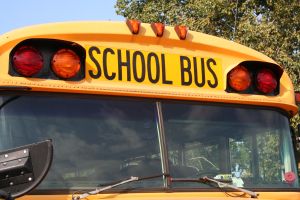You probably know how the phrase “canary in the coal mine” came into being, but it doesn’t hurt to repeat it. Before there were other ways of monitoring for dangerous gases in coal mines, like carbon monoxide, miners took caged canaries with them into the tunnels. If gases were present, they would kill the canaries first, perhaps giving the miners a chance to escape. They were what we might call an early warning system today.
There were some big ole yellow canaries in the school bus lanes of Wake County’s public schools last week. The first days of the year were a disaster, at least in terms of transportation. Children waited for buses that ran late or never came at all. In the afternoons, some kids didn’t get home until 6:00 or later. The school system fielded thousands of calls from irate parents.
It turns out that the county had decided to take 52 of its 933 school buses off the road this fall, even though thousands more students were expected in the school system. You will probably not be surprised to learn that the reason was money. The county hoped to save $5 million in operating costs and get back $3 million in lost state revenue.
The state’s General Assembly has cut hundreds of millions of dollars from public school funding. Legislators gave great flexibility to local school systems in deciding how to absorb those cuts. Of course, that also let legislators off the hook for making the cuts and shifted the responsibility for adequate school funding down to local officials.Wake County apparently decided to save some of the lost funding by cutting back on school buses. As Wake County Superintendent Tony Tata noted, “If I don’t take the $5 million out of transportation then the likelihood is that it’s got to come out of schools somewhere. So how do I do that? That’s a fair number of teachers.” While the effort to save teachers’ jobs is laudable, it came with consequences.
School buses are the canaries in this picture, an early warning system regarding school budget cuts. Reductions in funding to local school systems are having various results: fewer teachers and teachers’ aides, larger classes, older textbooks, delayed maintenance, and, yes, fewer buses. Have no doubt about it: those changes will damage the public schools and lower the quality of education our children get there. But it will often take months or years for the harm to be evident, or for it to be measurable. It took only a couple of days, however, for the impact of budget cuts on school buses to show up. It wasn’t a pretty scene, and Wake has already announced that it is adding back 34 of its moth-balled buses.
At least for now, their work as canaries is over. But you do wonder where the $5 million is coming from now, how it will harm children’s educations, and how long it will take for us to notice.
–George Reed, Executive Director

